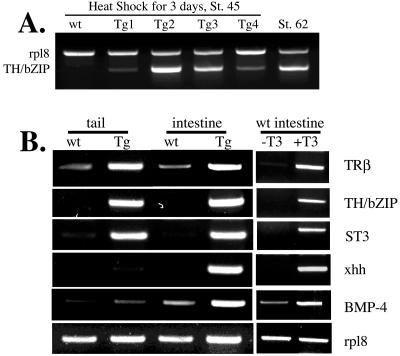FIG. 7.
Transgenic expression of F-dpTR leads to the activation of known T3-regulated genes in the absence of T3. (A) The T3 response gene, TH/bZIP, is upregulated in whole bodies of early premetamorphic tadpoles (stage 45). Total RNA was extracted from whole bodies of individual stage (St.) 45 wild-type (wt) and transgenic (Tg) tadpoles after 3 days of heat shock and subjected to RT-PCR. No expression was detected in wild-type tadpoles, whereas variable levels of upregulation were observed in four different F-dpTR transgenic tadpoles, and this range of expression encompassed that seen in the tails of wild-type tadpoles at the climax of metamorphosis (stage 62). The gene rpl8 was used as an RNA-loading control. (B) F-dpTR regulates gene expression as in T3-treated wild-type tadpoles. Wild-type and F-dpTR transgenic tadpoles blocked at stage 52 by methimazole were heat shocked for 4 days, and RT-PCR analysis was carried out on RNA isolated from tails and intestines for the expression of T3 response genes, with the T3-independent gene rpl8 as an internal control. For comparison, the same analysis was carried out on intestines from wild-type tadpoles treated with 5 nM T3 for 3 days. The following genes were analyzed: TRβ and TH/bZIP, ubiquitously expressed, direct T3 response genes; stromelysin-3 (ST3), a fibroblast-specific, direct T3 response gene; sonic hedgehog (xhh), an intestinal, epithelium-specific, direct T3 response gene; and bone morphogenic protein 4 (BMP-4), a fibroblast-specific, late upregulated gene. The experiments were repeated with similar results for six transgenic tadpoles showing a phenotype similar to that seen in Fig. 4.

